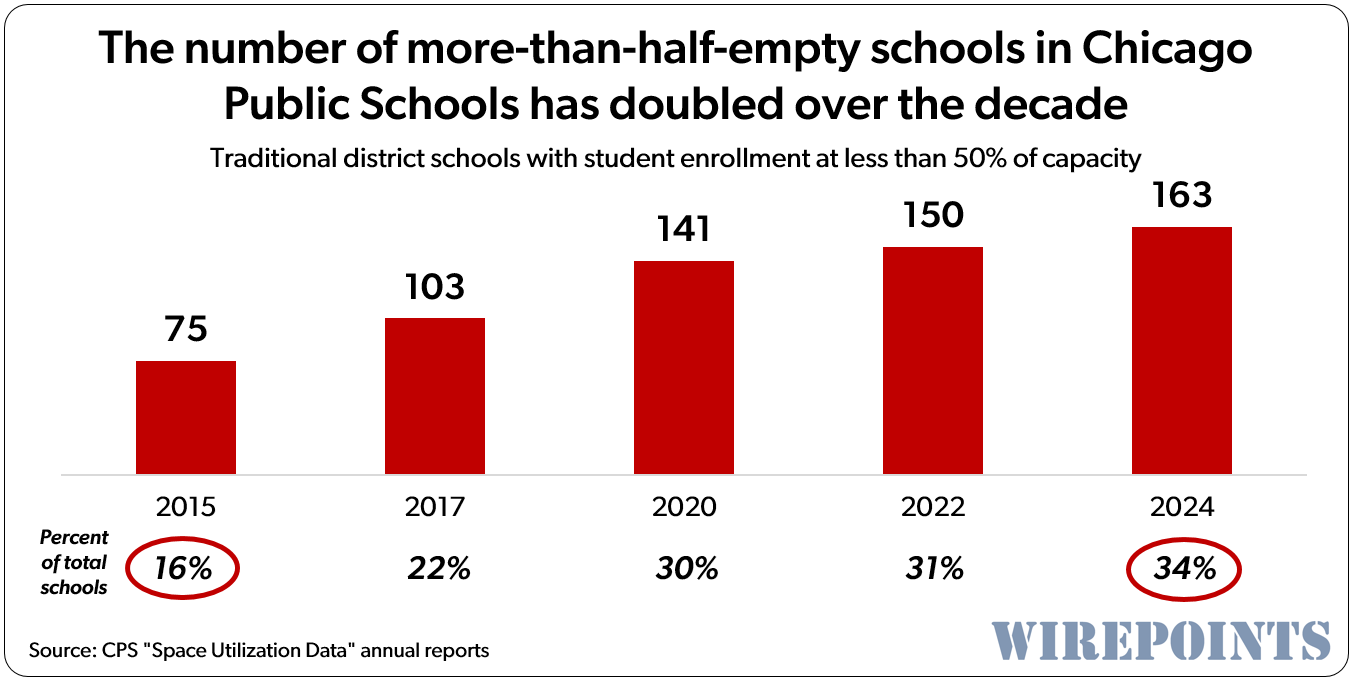By: Mark Glennon*
We’re hesitant to suggest anything that would make Chicago’s proposed $10 billion pension obligation bond more attractive because it’s fundamentally an awful idea that shouldn’t be pursued in any form. (See our articles linked below for the background.)
However, if it it does proceed, it should be linked to reforms for Chicago’s pensions that would reduce the unfunded liabilities crippling the city. Why just give $10 billion to the pensions with no strings attached?
The $10 billion could easily be tied, constitutionally, to just the kind of pension reforms that Illinois courts have struck down.
Here’s one way it might work: Put the $10 billion of bond proceeds into a new, separate retirement account. Let participants in the existing pensions have their share of the new account but only if they agree to a benefit reduction in their existing pension — perhaps an increase in the retirement age or a reduction in the automatic annual COLA. Maybe the new account would be a 401k-style plan or some other defined contribution plan.
Existing pensioners would then have a choice of either 1) accepting the new, fully funded benefit plus their modified old benefits, or 2) keeping their entire existing promises from their old pension. Those old pensions, however, are hopelessly underfunded (their consolidated funding ratio is just 26%.)
Use your imagination and it’s pretty easy to come up with variations on how it might work. The basic idea, however, would be a voluntary trade of something new, funded with the $10 billion, for some adjustment to benefits in the old pension.
 Yes, some pensioners still think the Illinois Constitution makes their existing pension risk-free and wouldn’t make any trade. But most have to know that haircuts are inevitable. They’d also see the virtue in changes that improve the funding level of their existing pension.
Yes, some pensioners still think the Illinois Constitution makes their existing pension risk-free and wouldn’t make any trade. But most have to know that haircuts are inevitable. They’d also see the virtue in changes that improve the funding level of their existing pension.
In any case, the choice would be entirely voluntary, and the value of the benefit in the new account could be properly matched to the benefit adjustment in the old pension, to ensure fairness and sufficient participation.
No constitutional problem would arise because participation would be entirely optional.
How much would it save? That is, by how much could the current $28 billion of unfunded pension liability be reduced? I can’t venture an estimate, but the savings no doubt could be very meaningful. That’s because $10 billion in hard cash provides a darn big incentive, and surely could be traded off for significant benefit adjustments.
Regardless of how big the savings would be, why not get something? Why just hand over $10 billlion?
*Mark Glennon is founder and Executive Editor of Wirepoints.
For further background on the proposed pension obligation bond:
- Aug. 5 – Rahm Emanuel’s latest can kick: Borrow $10 billion for Chicago pensions
- Aug. 15 – $125,000: The pension debt each Chicago household is really on the hook for
- Aug. 19 – How Emanuel is misleading you on the city’s debt – Crain’s
- Aug. 24 – Pension Obligation Bonds Are Like Big, Fat, Dangerous Margin Loans For Stock
- Aug. 26 – Chicago CFO’s Stupendously Bad Timing On Her Last Pension Obligation Bond
- Aug. 28 – Emanuel’s real motivations for Chicago’s $10 billion pension bond plan
- Aug. 29 – A plan to make “bad pension borrowing” good? Greg Hinz is mighty confused
- Aug. 30 – Liquidation Sale. That’s How To Think About Chicago’s Proposed Pension Bond
- Aug. 31 – Emanuel’s misleading pension bond presentation to Chicago aldermen


 A set of state lawmakers want to extend CPS’ current school closing moratorium to February 1, 2027 – the same year CPS is set to transition to a fully-elected school board. That means schools like Manley High School, with capacity for more than 1,000 students but enrollment of just 78, can’t be closed for anther three years. The school spends $45,000 per student, but just 2.4% of students read at grade level.
A set of state lawmakers want to extend CPS’ current school closing moratorium to February 1, 2027 – the same year CPS is set to transition to a fully-elected school board. That means schools like Manley High School, with capacity for more than 1,000 students but enrollment of just 78, can’t be closed for anther three years. The school spends $45,000 per student, but just 2.4% of students read at grade level. Hopefully, all media will get the message, in Illinois, too.
Hopefully, all media will get the message, in Illinois, too. Ted joined Tom Miller of WJPF to talk about Illinois’ highest-in-the-nation property taxes, why lawmakers don’t want to touch the tax’s cost drivers, just how much Illinoisans’ tax burden has grown over the decades, why Gov. Pritzker failed to meet his promise to reform property taxes, and more.
Ted joined Tom Miller of WJPF to talk about Illinois’ highest-in-the-nation property taxes, why lawmakers don’t want to touch the tax’s cost drivers, just how much Illinoisans’ tax burden has grown over the decades, why Gov. Pritzker failed to meet his promise to reform property taxes, and more.
Good article, once again, Mark !!! It’s such a bad idea, promising to pay back the $10B loan with collateral which would give lenders essentially ‘ownership’ of the taxpayers’ future money, and for what benefit? Possible spread on investment earnings that could exceed interest on the loan? That could backfire, what if the $10B into the DB trust funds loses 20% in first few years? Bingo, money not there but still owed to lenders. CRIKEY ! But small disagreement — a complicated tweaking of the whole charade would never end up working well, in my humble opinion. What might be… Read more »
Ridiculous. This is simply a coerced reduction of a benefit. Employee action to reduce a benifit out of fear of losing even more, is coercive and hardly voluntary action. Your logic asserts that since the government is gonna short an employee’s pension eventually….. why shouldn’t that employee then contractually agree to to reduce their own pension (voluntarily nonetheless) for a better haircut. But if the govt can indeed short a pension in first case…they can also short the pension again in the second case. The second adjusted pension is no more secure than the first pension. Pensions subject to haircuts… Read more »
The bond proceeds go into the pension trust. Once that happens, those proceeds must be spent for pensions. The bankruptcy of Chicago or other plan sponsor does not result in the creditors of those sponsors (other than the retirees) being able to get at those trust assets. Hence, current and future retirees are collectively better off by $10 billion or whatever the number turns out to be. The debt represented by the bonds is a debt of the sponsor and the other creditors of the sponsor (alongside the bondholders) will be able to make claims against the sponsor’s assets but… Read more »
There may indeed be coercion in the particular example I have of how it might work, depending on how aggressively it was structured, and maybe that would risk a court challenge if it were strong coercion. However, you are missing the bigger point, which is don’t give away something for nothing, and that’s not coercive. Think of this in its simplest form — just make it part of the collecting bargaining process now starting for the new contracts. Say, “we’ll do a pension bond if you back off on x, y, z.” That would not be coercion or have any… Read more »
Advocate: It’s not ok to hold the hardworking taxpayers hostage, to keep promises THEY had no influence on….promises that were VASTLY too generous and paid MUCH too early, for govt ees. Period.
Putting 10b of borrowed money into anything amounts to money laundering. Everyone seems to think the borrowed money somehow becomes “clean” just because it’s been parked into the slush fund of a pension? Even moodys will think it’s clean money and reward the city with a more favorable risk rating. This article amounts to more laundering of dirty money so that the controlling powers, moodys, etc. Can just get on with the ponzi.
If by “reform” one means bankruptcy, with younger generations refusing to honor everything older generations promised to themselves but were unwilling to pay for, who knows? Borrowing $10 billion to buy other assets such as stocks and bonds, at a time when every asset is vastly overpriced based on the income it generates and heading for a collapse, with even that level of income only made possible by a debt-driven consumer economy which is itself due to collapse, might actually speed reform. https://larrylittlefield.wordpress.com/2018/09/06/rising-u-s-debt-is-the-real-cause-of-the-u-s-trade-deficit-and-inequality/ It isn’t just Illinois and it isn’t just pensions and other retirement benefits. It’s the whole Generation… Read more »
If by “reform” one means bankruptcy, with younger generations refusing to honor everything older generations promised to themselves but were unwilling to pay for, who knows?
++++++++++++++++++++++++++++++++++++
One can only hope the younger taxpayers revolt. It is a travesty of justice for any public sector employee to get a dime of pension or healthcare benefits. I only hope the true taxpayers wake up and do what they have to to defend their wallets against the pilfering.
or maybe offer lump sum buyouts?
No, that’s really different. That brings in the problem of adverse selection — smoking, overweight, triple bypass skydivers are the first takers, which mucks up the mortality tables. If this is done right you can mitigate that issue.
We had a whole bunch of early retirement “incentives” in NY that “saved money.”
Providing an additional benefit option to those who already have far richer retirement benefits than most non-executive private workers and later hired public employees is only a way to improve things according to the beneficiaries — like a pension bond.
Exactly, Mark !
That wouldn’t help and would only speed up the depletion of assets, essentially by giving 100% of present value lump sum takers, and leaving fewer assets for everyone else, who’d therefore have to take more of a haircut.